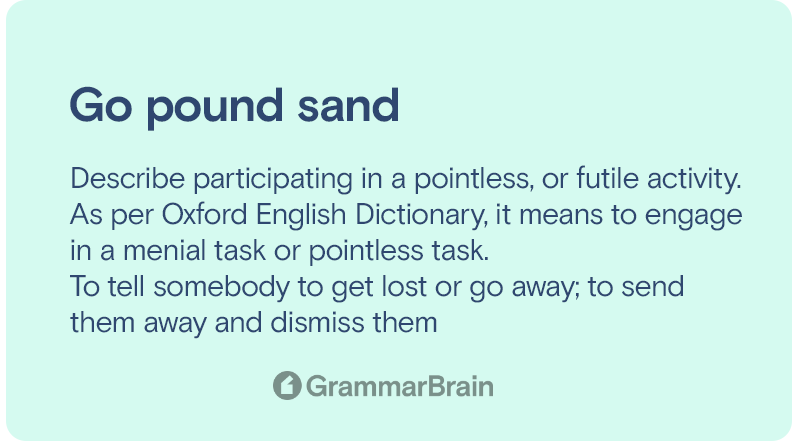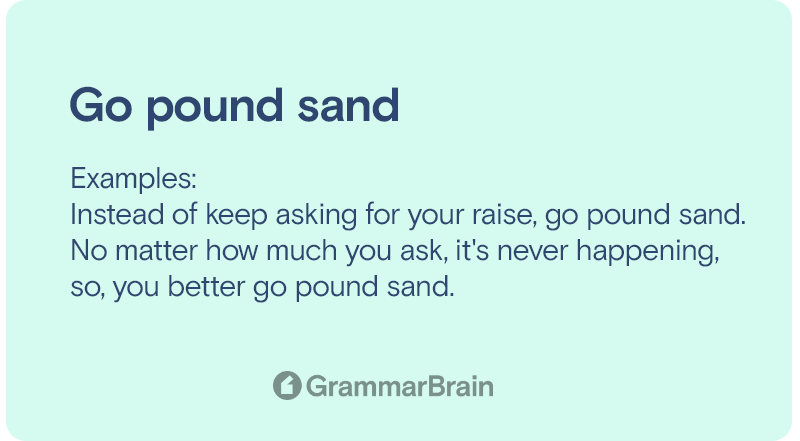What does “go pound sand” mean? Has someone used the term “go pound sand” in front of you ever? Do you know what this means? In this article below, we are going to discuss what Go Pound Sand means as well as where the term came from.
Moreover, we’ll also give some good examples of the usage of this term with proper sentences and conversations. This term, a little bit of humorous insult originated back in the early 20th Century and still it is heard throughout the United States today, particularly in the Midwest.
In case you want to add this term to your dictionary, here is a deeper look at all you need to know…

Definition of Go Pound Sand
The ‘Go pound sand’ idiom is an American disgust expression, meaning ‘get lost’ or ‘go away. The expression “go pound sand”(meaning not enough sense to go pound sand) is an American slang dating back to the 19th CE.
The meaning of this phrase is twofold:
- Describe participating in a pointless or futile activity. According to Oxford English Dictionary, it means engaging in a menial or useless task.
- To tell somebody to get lost or go away, to send them away and dismiss them
NOTE:
One meaning is simply to tell somebody to go away or get lost.
The second one means to let somebody know that what they’re asking for is never turning into a reality and thus, you tell them to simply “go pound sand”.
There are a few similar versions to the expression pounding sand. These are “go whack sand.” or “go pound salt.” All of them mean the same thing.
The idiom even has a lengthier expression which is “go pound sand in your ears.” Here “ears” meant to soft-pedal the noise. It is the less vulgar version.
Origin of The Idiom Pound Sand
The phrase pounding sand or the expression dates back to the 19th CE. However, the exact origin of this phrase is quite murky. Some believe it is a product of World War II, while others deny it.
“The source of the phrase is from a little more extended expression, which meant not to have sufficient sense to pound sand down any rathole. This phrase originated from the midwestern United States and is most commonly used there.

Examples of Usage (Sentence Examples)
It is quite common to hear the phrase but often people do not know where and how to use this phrase.
Here are a few examples:
- Instead of keep asking for your raise, go pound sand.
- No matter how much you ask, it’s never happening, so, you better go pound sand.
Examples In Conversations
If you’re curious to know the usage of go pound sand in conversations, here are a few good examples to know what you can say during a conversation:
Conversation 1: Between Friends
- Friend 1: “I am thinking of asking my crush out on a date.”
- Friend 2: “Do you think you stand a chance?”
- Friend 1: “Of course I do.”
- Friend 2: “Well, you can keep kidding, or it’s better if you go pound sand.”
Conversation 2: Between Colleagues
- Colleague 1: “Don’t you think you should stop repeating the same mistake on those emails?”
- Colleague 2: “Why? What have I done? I really can’t find any problem there.”
- Colleague 1: “Well, I can, you are the big problem.”
- Colleague 2: “Oh, please! Shut up and go pound sand.”
Some More Ways to Use this Idiom
- Go and pound salt
- Go play in traffic
- Pound sand
Conclusion
If you are searching for the perfect way to tell somebody to get lost or go away, the “go pound sand” idiom is a classic choice. It vividly expresses annoyance, honored with disgust.
Simultaneously, it isn’t overly hostile or vulgar, so the idiom has an acceptable broader range of usage than outright swearing. Additionally, even though it isn’t the most commendable phrase, it is foolproof to grab the attention of the targeted person!
FAQs
What are similar phrases to “go pound sand?”
Similar phrases are:
- Go fly a kite
- Go pound salt
- Go kick rocks
- Take a hike
What does the saying go pound salt mean?
This means ‘Get lost’ or ‘Go away. This phrase originated in the United States, and even though common there, particularly in the midwest states, it’s barely used anywhere else.
When you encounter a hopelessly stupid person, you can use the phrase against that person.
Inside this article
Fact checked:
Content is rigorously reviewed by a team of qualified and experienced fact checkers. Fact checkers review articles for factual accuracy, relevance, and timeliness. Learn more.
Core lessons
Glossary
- Abstract Noun
- Accusative Case
- Anecdote
- Antonym
- Active Sentence
- Adverb
- Adjective
- Allegory
- Alliteration
- Adjective Clause
- Adjective Phrase
- Ampersand
- Anastrophe
- Adverbial Clause
- Appositive Phrase
- Clause
- Compound Adjective
- Complex Sentence
- Compound Words
- Compound Predicate
- Common Noun
- Comparative Adjective
- Comparative and Superlative
- Compound Noun
- Compound Subject
- Compound Sentence
- Copular Verb
- Collective Noun
- Colloquialism
- Conciseness
- Consonance
- Conditional
- Concrete Noun
- Conjunction
- Conjugation
- Conditional Sentence
- Comma Splice
- Correlative Conjunction
- Coordinating Conjunction
- Coordinate Adjective
- Cumulative Adjective
- Dative Case
- Determiner
- Declarative Sentence
- Declarative Statement
- Direct Object Pronoun
- Direct Object
- Diction
- Diphthong
- Dangling Modifier
- Demonstrative Pronoun
- Demonstrative Adjective
- Direct Characterization
- Definite Article
- Doublespeak
- False Dilemma Fallacy
- Future Perfect Progressive
- Future Simple
- Future Perfect Continuous
- Future Perfect
- First Conditional
- Irregular Adjective
- Irregular Verb
- Imperative Sentence
- Indefinite Article
- Intransitive Verb
- Introductory Phrase
- Indefinite Pronoun
- Indirect Characterization
- Interrogative Sentence
- Intensive Pronoun
- Inanimate Object
- Indefinite Tense
- Infinitive Phrase
- Interjection
- Intensifier
- Infinitive
- Indicative Mood
- Participle
- Parallelism
- Prepositional Phrase
- Past Simple Tense
- Past Continuous Tense
- Past Perfect Tense
- Past Progressive Tense
- Present Simple Tense
- Present Perfect Tense
- Personal Pronoun
- Personification
- Persuasive Writing
- Parallel Structure
- Phrasal Verb
- Predicate Adjective
- Predicate Nominative
- Phonetic Language
- Plural Noun
- Punctuation
- Punctuation Marks
- Preposition
- Preposition of Place
- Parts of Speech
- Possessive Adjective
- Possessive Determiner
- Possessive Case
- Possessive Noun
- Proper Adjective
- Proper Noun
- Present Participle
- Prefix
- Predicate



